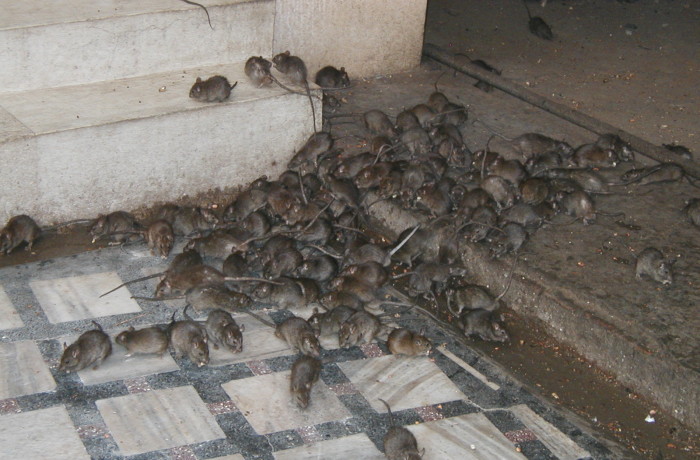The Leader of the Opposition and of the Liberal Democrat Group on Oldham Council, Councillor Howard Sykes MBE, is calling for action to combat giant rats in Oldham Borough.
Councillor Sykes is proposing a motion on this issue to Wednesday’s full Council (13/07/16) and he explained why:
“The image of giant rats in our Borough may sound like a vision of horror from a James Herbert novel but the industry’s professional body, the British Pest Control Association, has recently issued a report identifying rats of increased size and with an increasing resistance to conventional poisons as a real problem in urban Britain.”
Commenting Councillor Sykes said: “In our motion we recognise that sometimes residents can inadvertently make the situation worse by resorting to ineffective off-the-shelf poisons.”
“This means that the rat problem is often not eliminated and repeatedly exposure to these poisons enables rats to become more resistant to them.”
Councillor Sykes is proposing that Oldham Council promotes the services of its professional pest controllers to residents, and the Chief Executive is asked to write to local MPs asking them to call for Government action in Parliament.
He explained: “Only a pest-control specialist has access to the most toxic poisons with the proven ability to eliminate even the most-troublesome and largest rodents.”
“Whilst calling the rat-catcher costs money it does provide a guarantee that the treatment will be effective and can be carried out without harm to family members and pets.”
Concluding Councillor Sykes said: “We have to recognise that Oldham Council and its residents can only do so much. This is a national problem and our national Government needs to take action.”
The motion to Council reads:
Council 13th July 2016 – Notice of Opposition Business –
Combatting Super Rats
This Council notes that:
The British Pest Control Association (the BPCA) has said that rats are becoming immune to traditional pellets used by homeowners and that the poisons which can be purchased in supermarkets may actually be turning the rodents into ‘super rats’.
The Chief Executive of BPCA has said, “The rodents have become resistant and, in some cases, immune to off- the-shelf poisons to the point where they’re actually feeding off the toxic pellets, which means their size and strength is increasing.”
Genetic testing by Huddersfield University has revealed that the rodents have developed a mutation that allows them to survive conventional poisons. In counties such as Hampshire, Berkshire, Surrey, Wiltshire, a Suffolk, and Kent, all the rats tested were found to have immunity to poison.
Rodents are difficult to kill with poisons because their feeding habits reflect their place as scavengers. Rats will eat a small amount of food and wait, and if they don’t get sick, they then continue to eat.
Council further notes that.
Stronger rodenticides can be more effective, but most are subject to strict legislation and must only be used by professional pest controllers.
The BPCA is now predicting that rats are likely to seek to enter homes for warmth and food during the winter months
Rats can squeeze themselves through gaps as small as three-quarters of an inch and are often found living under floorboards, in the walls or in the loft.
In 2015, rats measuring 50-60 cm (2ft) have been captured in places as far apart as Cornwall, Kent and Liverpool.
Rats can carry illnesses which can be passed to humans, including Weil’s disease, which has flu-like symptoms initially but can lead to jaundice and kidney failure.
Rats chew on wood and electrical wires causing significant property damage and posing a fire hazard.
Council believes:
That rats are a danger to the health and wellbeing of residents
That the problem of an increasing rat population, which is immune to many standard poisons, must be addressed
Inexpert use of poison can make the problem worse
Council resolves to:
Ask the relevant Cabinet Member(s) to request officers publicise the risk posed by poison resistant rats and offer advice as to how residents can ‘rat proof’ their homes, by for example fitting strips to the bottoms of doors, filling small gaps in exterior walls, repairing roof damage and covering drains to prevent entry via pipes.
Ask the Chief Executive to write to our three local Members of Parliament asking them to lobby the Government for national action on the problem of super rats.


In our personal experience the council ‘rat-catcher’ came within an hour of our reporting the problem and quickly solved our problem. It seems that the prevalence of takeaways and the corresponding issue of customers discarding the remains of their food and packaging only exacerbates the problem – too many takeaways with low management of litter outside. This only encourages rats to gather – it’s a takeaway for them too! – then to go to neighbouring houses.
Not only are they becoming resistant to poison but they also learn pretty quickly and have a good memory. In my experience as a professional rat exterminator, over the counter traps are also ineffective – you can catch a rat once but the others will learn from it and will remember to avoid them in the future.
Rat infestations are becoming more and more difficult to deal with and residents need to do only two things – prevent them from entering and avoid using poisons.
Amber M. | Pest Expert @ http://www.247pestcontrol.co.uk/rat-control/